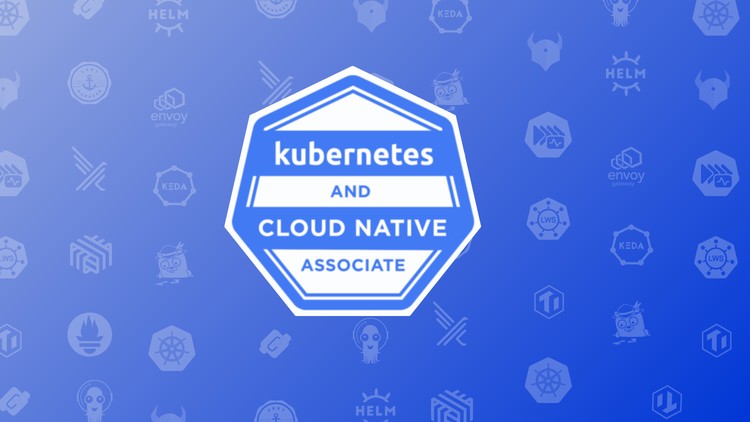
Ace the KCNA exam with 6 practice tests having 60 questions each covering core Kubernetes and cloud-native concepts.
⭐ 4.64/5 rating
👥 4,763 students
🔄 July 2025 update
Add-On Information:
Note➛ Make sure your 𝐔𝐝𝐞𝐦𝐲 cart has only this course you're going to enroll it now, Remove all other courses from the 𝐔𝐝𝐞𝐦𝐲 cart before Enrolling!
-
Course Overview
- This ‘Kubernetes and Cloud Native Associate (KCNA) Practice Exams’ is your essential preparation for the official KCNA certification. Designed to validate foundational cloud-native understanding, including Kubernetes and container orchestration, it acts as a rigorous assessment tool. The course mirrors the actual exam’s structure, difficulty, and coverage, enabling candidates to test conceptual knowledge.
- The course offers six full-length practice tests, each with 60 carefully curated questions. This extensive bank ensures broad exposure to diverse scenarios, reinforcing understanding across relevant cloud-native domains. Questions evaluate grasp of cloud-native principles, fundamental Kubernetes architecture, components, objects, and modern application deployment philosophies, ensuring comprehensive readiness.
- A testament to its quality, the course boasts a 4.64/5 rating from 4,763 students. Crucially, the material is maintained with a July 2025 update, guaranteeing all content aligns with latest best practices, terminology, and curriculum objectives from the Cloud Native Computing Foundation (CNCF).
-
Requirements / Prerequisites
- While KCNA is for cloud-native newcomers, these exams benefit from foundational IT concepts. This course is for exam preparation, not an introductory Kubernetes guide.
- A basic understanding of the Linux command line interface (CLI) is highly beneficial for interpreting question scenarios related to cloud-native operations.
- Familiarity with networking fundamentals (IP, ports, DNS) is advantageous, as these principles underpin Kubernetes’ distributed architecture and clarify questions.
- An elementary grasp of containerization concepts (what a container is, its benefits) provides essential groundwork, given KCNA’s emphasis on container principles.
-
Skills Covered / Tools Used
- This course rigorously tests and reinforces conceptual understanding across cloud-native skills, using structured questions as the primary learning ‘tool.’
- Skills Covered:
- Kubernetes Core Concepts: Mastery of Kubernetes architecture, Control Plane/Worker Node components, and essential objects (Pods, Deployments, Services, ConfigMaps, Secrets, Volumes).
- Containerization Foundations: Grasp of container lifecycles, image management, runtimes (e.g., containerd), and benefits.
- Cloud-Native Principles: Comprehension of microservices, immutable infrastructure, declarative APIs, and resilience patterns.
- Observability: Understanding monitoring (Prometheus), logging (Fluentd), and tracing (Jaeger) basics.
- Networking & Storage: Conceptual knowledge of Kubernetes networking (service discovery, Ingress, CNI) and persistent storage (PVs, PVCs, CSI).
- Security & CI/CD: Awareness of cloud-native security (secrets, RBAC) and CI/CD/GitOps principles.
- CNCF Landscape: Exposure to key Cloud Native Computing Foundation projects.
- Tools/Technologies Referenced (Conceptually):
- `kubectl`: Role in cluster interaction.
- Docker/containerd: Container runtimes.
- Helm: Application packaging function.
- Prometheus & Grafana: Monitoring components.
- Fluentd/Loki & Jaeger/Zipkin: Logging and tracing solutions.
- Cloud Services: General Kubernetes integration with cloud resources.
- CNI/CSI: Network and storage interfaces.
-
Benefits / Outcomes
- Significantly increases your likelihood of passing the official KCNA certification exam due to precise alignment with objectives.
- Provides a robust, formally recognized understanding of fundamental Kubernetes and cloud-native concepts, offering verifiable credentials.
- Detailed explanations identify knowledge gaps, enabling targeted revision to strengthen areas before the exam.
- Boosts career trajectory in the high-demand cloud-native field, signaling readiness for advanced learning and modern infrastructure practices.
-
PROS
- Extensive Practice: Six full practice tests (360 questions) for thorough preparation.
- Authentic Simulation: Questions mirror actual KCNA exam’s style, complexity, and topics.
- Highly Rated: Outstanding 4.64/5 from 4,763 students, proving effectiveness.
- Always Current: July 2025 update ensures alignment with latest exam standards.
- Detailed Feedback: Comprehensive explanations for deeper learning.
- Flexible Learning: Self-paced study tailored to individual needs.
-
CONS
- No Hands-on Practice: Focuses purely on theoretical assessment, lacking interactive lab environments for practical application.
Learning Tracks: English,IT & Software,IT Certifications
Found It Free? Share It Fast!